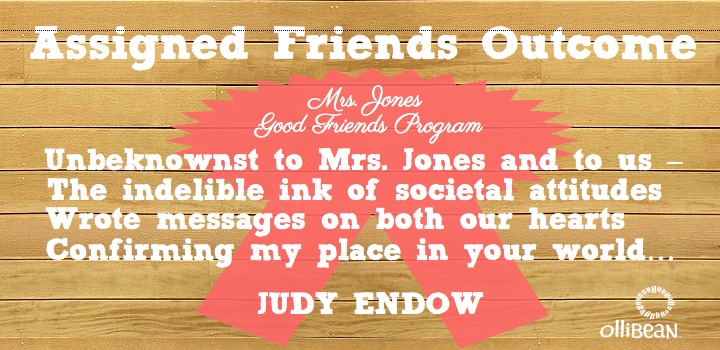
I was taught to say, “Thank you for being my friend.”
So I say it.
I was told to smile like I mean it.
So I smile.
I know I am supposed to feel grateful
That you are my friend
That you took the class
On how to be a peer mentor to me –
The good friends way –
A pal for six weeks
You have been defined
You are a good person
For giving up your spot
At the popular kids’ lunch table
To earn the community service hours
You need for graduation
By eating lunch with me,
By being my assigned friend.
I ask, “Do you know Jerry Lewis?”
Because I think you would like him
I think you are a modern day Jerry Lewis –
A good Samaritan who calls himself friend.
You don’t have a telethon on TV,
But you have the Jerry Lewis Telethon
In you heart
Imparted by Mrs. Jones in her Good Friends Program.
You are a good person.
You are a trained good Samaritan now called “friend.”
Definition of good Samaritan
“A person who gratuitously gives help or sympathy
to those in distress.”
Says dictionary.com
Next month you will get your community service credit.
Your lifelong attitude about people like me
Will have been shaped
Because the peer mentoring training
Has passed on to you
Society’s adoption of Jerry Lewis’ ideas about me –
A person in need of sympathy
And a person in distress
Only because I am me – an autistic
We have become fake friends
For six weeks –
A Mrs.-Jones-Good-Friends-Program-success!
Your benevolence;
My neediness
Having been defined
With a line drawn between us
Our two groups separated
Defined, distinct, different from each other –
Society’s wisdom at categorization…
When it is over
We say our goodbyes
And like I was taught I say,
“Thank you for being my friend.”
And I remember I am meant
To smile like I mean it.
So I smile.
Goodbye peer mentor –
My assigned pal
From Mrs. Jones Good Friends Program.
You go on to your next project
I wait for my next assigned friend to eat lunch with
Both of us having been marked by the experience
Unbeknownst to Mrs. Jones and to us –
The indelible ink of societal attitudes
Wrote messages on both our hearts
Confirming my place in your world…
That it is indeed YOUR world
And thus, your right
To continually put me in my place
For which I am meant to say,
“Thank you for being my friend.”
And to smile like I mean it.
And this status quo could march on and on
EXCEPT
Yesterday I stopped smiling
And for all the rest of my todays
I will no longer say
“Thank you for being my friend.”
Even though I know I am meant to.
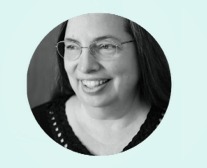 JUDY ENDOW, MSW
JUDY ENDOW, MSW
Judy is an autistic author and international speaker on a variety of autism related topics. Read more from Judy on Ollibean here and on her website www.judyendow.com.

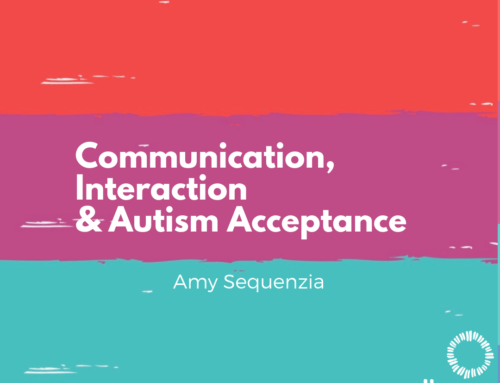
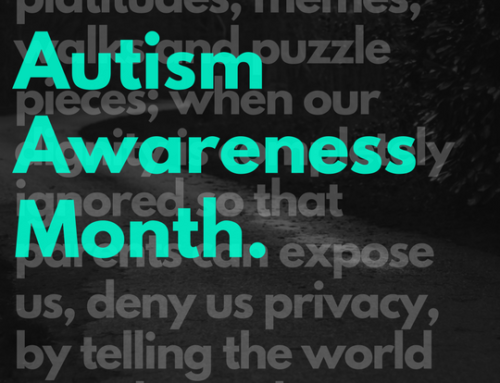
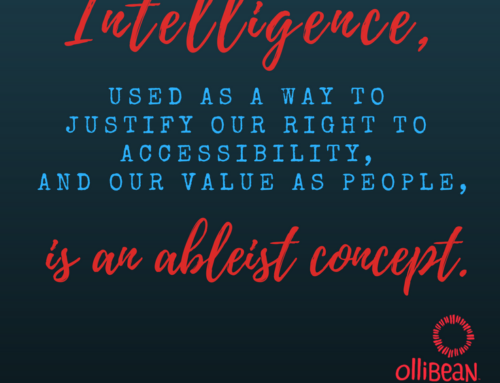
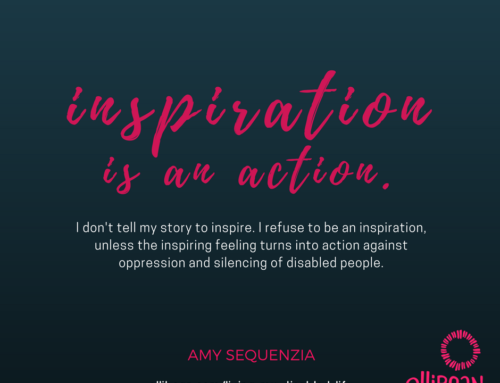
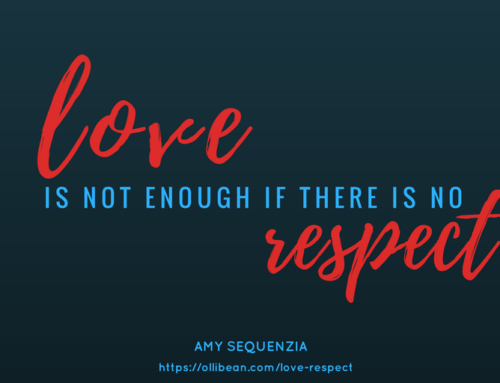
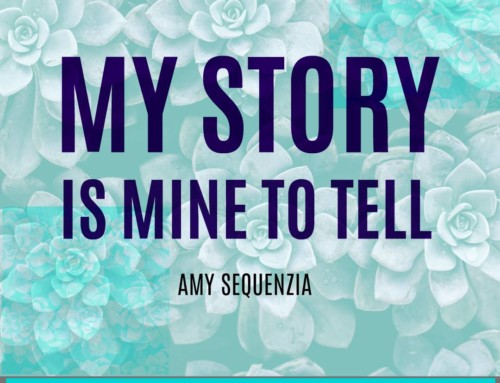
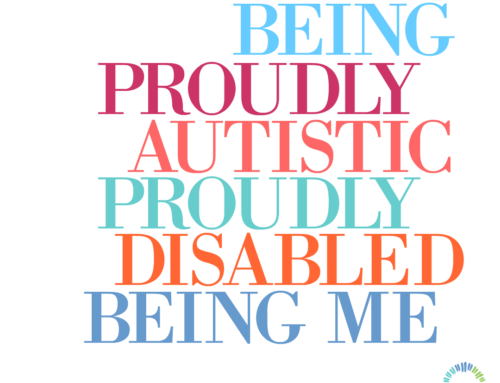
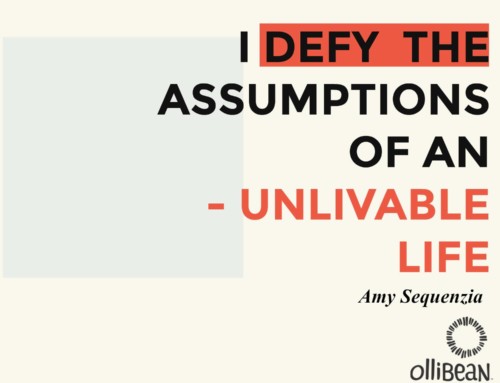
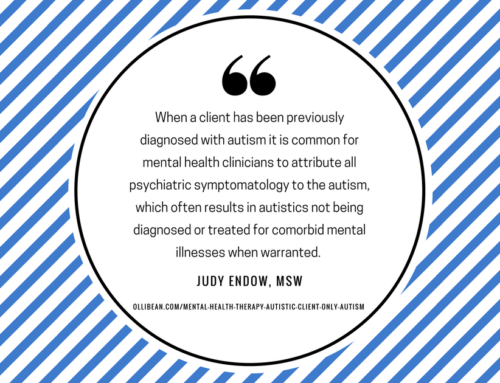
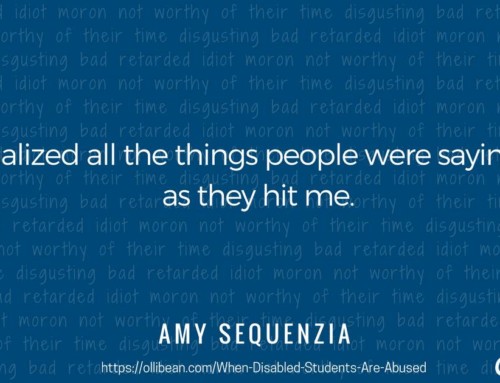

Judy – this is such an important piece. Thank you for writing it and having the courage, yes, courage to publish it, given that many will suggest these sorts of programs are good and helpful. Friendship is not something one can create through payment, whether that payment is in the form of money, credits or is a requirement by a school or institution. All children will sense and understand this. To tell a child this is their “friend” is to lie to them, and in any case all involved will know this without it being said. This kind of program must be rethought. Finding ways for our non-speaking children to communicate is a far better investment of time, energy and funds.
Friendships that occur naturally based on shared interests or chemistry are ideal . Unfortunately right now many people with disabilities don’t even have access to all of the opportunities and spaces that people without disabilities have because society is set up to accommodate the access needs of the majority. Hopefully that will change soon ! The problems arise when we set up peer/mentor , friendship program that aren’t equitable, that have the non-disabled person as the helper and the disabled person as the helpee. This paternalistic dynamic is terrible for everyone but especially damaging to anyone who is made to feel grateful that someone was their friend for a brief period of time. Every program I have seen is well intentioned and I know real friendship can and does happen sometimes , but ableism is so ingrained in our culture many don’t understand how it might be seen from the perspective you have written about. People with and without disabilities can and should contribute equally . Are there disabled people on the boards and in leadership positions in the programs? Certainly a person with a disability can be the “peer” and not just the “buddy or friend”. Do the students with disabilities get service hours for being involved if the students without disabilities receive them? I Am Norm is a great, equitable , diverse organization where youth with and without disabilities work together to promote social justice .
Thank you for sharing your experience. I am glad I am really your friend, and you are really mine. I will stand by you and have a disappointed facial expression when people try to act like they have a right to correct your own personal experience!
This reminds me of when I asked the school to encourage students to sit at the lunch table with my son… They said that they would have to send permission slips home with the other kids first! Can you believe that garbage! It was the fault of the teacher and the aides hovering over the lunch table in the first place! If a new boy or girl starts school they encourage others to friend them so why not my son with Aspergers? They should encourage friends for everyone one, real friends, not fake friends!
I understand your perspective but know my daughter really enjoys her peer buddies. As a non verbal person she doesn’t have the skills to make “friends” in the same way. The possibility of conversation isn’t there which is how most young girls make friends. What’s left is shared experiences. Although its not a “true” friendship, she enjoys and learns from her peer buddies.
We are told to fit in to wear a social mask of acceptance.
We teach our children with modeling of “typical peer” only to find out that in the end they will never become real friends.
For 8 years now my son, not one “neuro typical” friend in school and as children get older they learn to wear the mask that society expects them to wear, forced to fit in or be alienated.
It’s old philosophy unchanged with times relentless it continues to mold everyone except the few, those of us who refuse to wear the mask those who choose to be INDIVIDUALS, and still society speaks of acceptance.
I ask: can you accept me for who I am or must I wear your mask?
Judy, this piece is very important. I have tried to put words to it for years, and struggled with my feelings about these relationships. There has been benefit for my son, but I always knew that it made the distinction of “us” and “them”. That has always bothered me. I have tried to discuss it with others, but have had a hard time expressing the unintended consequences of such well meaning programs. You do that beautifully here. It is not an easy message to share, and a difficult message for many to hear and understand. It’s subtle. There are fun times, great connections, but at the end of the day, the friends are “helping”. I can now share your words, and the comments that follow, to help state my feelings more clearly. Thank you.
I think it’s a lovely piece because it speaks with such truth. Judy could be my friend, because I’d celebrate a person who speaks with such clarity. (And I’d share my lemon bars with her!)
wow-such a powerful piece. We really must rethink these forced friends programs. Thank-you for writing this (and I mean it!).
Incredibly important. Thank you for contenting to write on this topic. In addition to the issue you discuss, such programs can INTERFERE with normally developing friendships. Here’s a clip from a blog post I wrote about my son’s experience with Peer Pals:
During fall conferences, his Resource Room teacher told me that there was a friendship developing between Daniel and Brian, a boy who sat at his table in English and Math. Mrs. S was teary describing how the boys talked and laughed together. Daniel told me that he sat with Brian at lunch. The relationship did not extend outside of school, but Daniel never expressed an interest in doing so, and I never suggested it.
I discussed the the Peer Pals program with Mrs. S. She explained that his Peer Pals would share notes with Daniel if he missed a class, that he would have a Lunch Bunch so he wouldn’t “have to” sit alone in the cafeteria, and that the children would participate in fun activities to facilitate socialization. I decided to sign, but asked Mrs. S ensure that Brian did not become Daniel’s Peer Pal since their friendship was developing naturally.
A few weeks later, I discovered that Brian was Daniel’s assigned Peer Pal. Distraught, I called to ask how this had happened. The arrangement was a mistake. The social worker who runs the peer program, Mrs. K, had not communicated with Mrs. S prior to seeking peer mentors among the sixth graders.
They asked if I wanted Brian removed as Daniel’s Peer Pal, explaining, “Brian volunteered because he wanted to help Daniel.”
It was too late. I didn’t want Daniel to think Brian didn’t want him to be his pal. I didn’t want Brian to feel that his good deed had been rejected.
Daniel and Brian remained Peer Pals, assigned to each other. I was devastated, disappointed that I’d allowed a potential friendship to be marred.
~~~
So…what is your advice to people who run such programs? Is there any appropriate way to facilitate friendship, or is all interference inherently flawed?
We’ve set up a buddy program at our K-4 school. In our school we have two classes for students with autism that need extra support and 19 classes of students from the neighborhood. Most of the students in the two special ed classes are low verbal. All students from grades 3 and 4 have been invited to join our classes for recess in our classrooms.
We deliberately did not assign any friendships but have encouraged interactions through play. The comment I hear most often from our buddies about why they choose to come is because “it is fun”. We have lots of break out spaces so our students can safely opt out at any time if they are feeling stressed or overwhelmed. More and more students from both groups are finding ways to have fun together. It’s been a pleasure to watch as relationships slowly develop.
Thanks Judy for the reminder to stay aware of the unintended consequences of any program. I will try to stay alert.
I want to thank you for writing your thoughts on this and sharing your experience. Even though my 19 year old son is severely autistic and non-verbal, he has shown me, through his behavior, how hurt, angry, and disappointed he felt when placed in these “false friendships” while attending school. I believe he is so blessed to have his three siblings (one older and two younger) as they have shown the true meaning of friendship, loyalty and trust…all through honest communication with him. Thank you.
Thanks for this, Judy! I, too, struggle with these deliberate connections, particularly ones that promise some external benefit. There are so many intrinsic, mutual rewards for friendships cultivated between peers! And a note of distinction, Mrs. Jones’ Good Friends program is in no way associated with Good Friend’s student trainings. ;)
I think the purpose of these programs is not to put the befriended person in “his place” but to put the forced friend in the befriended’s place. Walk a mile in his shoes. It’s not so easy to walk away after the 6 weeks are over then, is it?!
my sons assigned friend, http://prntscr.com/2pzxea
;) Marlowe
My school tried to do this to my best friend because she had seizures. I was so angry! I told them not to bother, I’d be the assigned friend. I was the only one who reacted to her seizures anyway. It also made it so I could spend time with her that I otherwise wouldn’t have gotten otherwise (they let me out of my classes early so I could walk down the hall with her). The whole idea of assigning friends is just a way to make the person who is assigned as a friend into a victim. It makes them mad at the person they are supposed to friend. It was quite possibly the worst idea they could have come up with. Especially for someone as cool as my friend is.
Thank you
Aloha.May I thank you for sharing.I hope to be that honest also in my life. 360 degree’s. I feel,know,I’ve been taught a very important lesson. Wow. Mahalo for sharing with me !! Aloha
What a wonderful perspective you have given me. As a mother of a daughter with down syndrome who is in middle school, I find myself desperate to help her make connections. She just finished up 6th grade and does not have a single friend. This is so disheartening to me. She does have a lunch group on Tuesdays, but unfortunately, nothing genuine has come from that. The other girls do their “good deed” for the week, and that’s as far as it goes. I hope one day you will write about making true connections/friendships and what that looks like for someone who just doesn’t fit perfectly into the NT world!!!! Your writing is very touching and real. Thank you for sharing.
It is very hard. Our daughter has had good and bad “friendship” groups. Her closest friends are from her “spEd” class, and that is OK. My closest friends were in my classes too… Kids are clicky and we hope maturation will help.
Powerful thoughts.
Thank you so much for this post. In my organization’s (www.KITonline.org) work teaching inclusion to child care and recreation programs we often run into this type of “good friends” program. It is sometimes called “Pals” or “Buddies” and it always features community service credit and other incentives for the children with out disabilities. We work hard to dismantle these efforts and help the program staff see that there are other ways to help children with and without disabilities develop authentic and meaningful relationships. I am going to share this post widely.
Oops- should have posted that KIT post as me- Torrie Dunlap. I am the CEO of Kids Included Together
wow, thanks for sharing this Judy… I’m so glad I read through to the end… I also appreciate that Torrie Dunlap, CEO at KIT posted this so I too can share with others…
I have often wondered about this type of program. My son, who is not as socially aware as you are, felt great about his “assigned friends,” and never wondered why they were there or why they disappeared. I always felt uncomfortable because it seemed disrespectful — but figured “if my son is comfortable, then I should just get over it!”
What is a better way? Bonding in friendship is a give and take. It is experienced and takes time. NT’s have trouble making true friends too